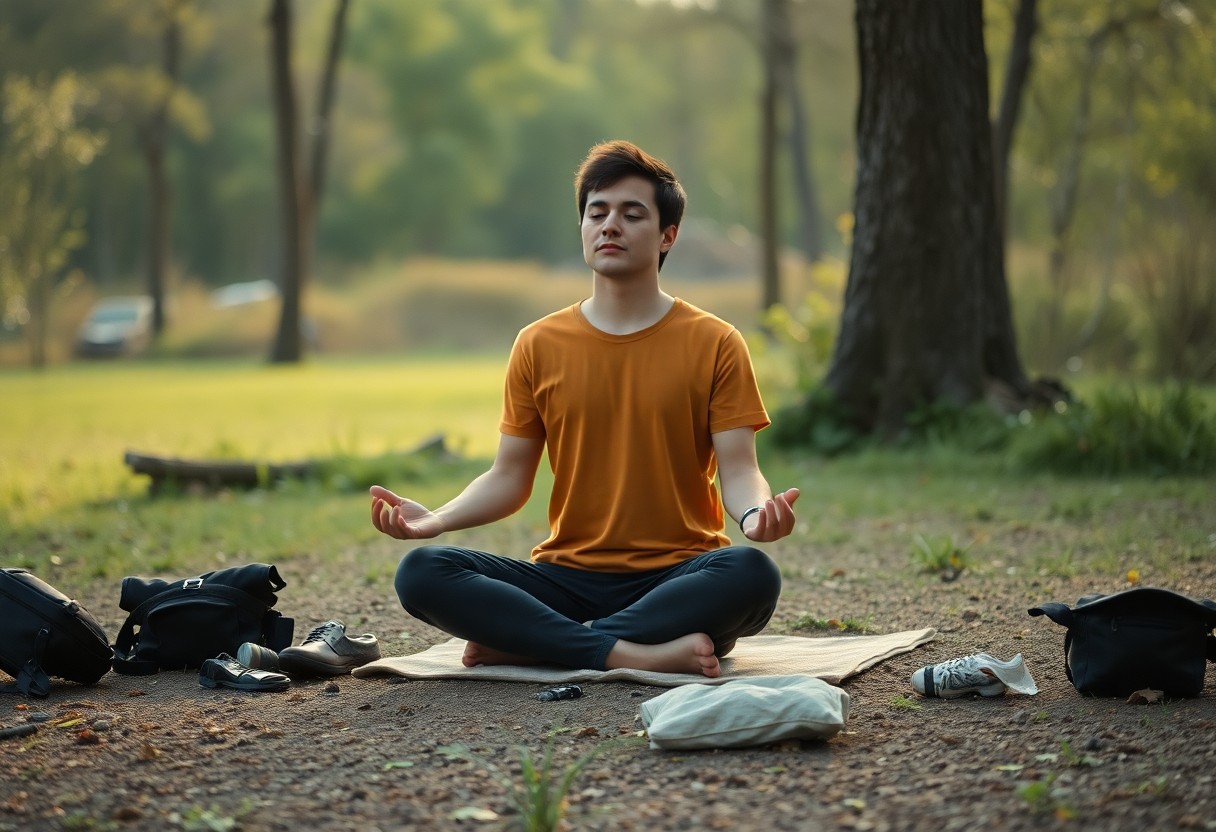Peace can often feel elusive in today’s fast-paced and chaotic environment, leaving many overwhelmed and searching for solace. You have the power to cultivate your inner tranquility through mindful practices and intentional choices. This blog post will guide you through effective strategies to reclaim your calm, helping you navigate daily stresses while nurturing your mental and emotional well-being. Embrace the journey toward finding your inner peace amidst the turmoil, and discover how small changes can lead to profound transformations in your life.

Key Takeaways:
- Mindfulness: Practice being present in the moment to reduce stress and increase awareness of your surroundings.
- Gratitude: Regularly acknowledge and appreciate the positive aspects of your life to shift focus away from chaos.
- Self-care: Prioritize activities that nurture your well-being, such as exercise, meditation, or hobbies.
- Boundaries: Set limits on your time and energy, ensuring you protect yourself from external chaos.
- Connection: Foster relationships with like-minded individuals who support your journey towards peace and balance.
Understanding Inner Peace
To cultivate inner peace, it’s important to grasp its true nature. Inner peace is a state of mental and emotional calmness, marked by a feeling of contentment that remains unaffected by external circumstances. In our fast-paced lives, attaining this tranquility can seem elusive, but understanding its principles lays a foundation for your journey toward serenity.
What is Inner Peace?
Across cultures and philosophies, inner peace represents a harmonious state of mind where stress, anxiety, and turmoil have little power. It’s about finding balance within yourself and achieving a sense of acceptance, enabling you to navigate life’s challenges with grace. This tranquility fosters resilience, allowing you to remain composed even amidst chaos.
The Importance of Inner Peace in Modern Life
To lead a fulfilling life today, embracing inner peace is important. The demands of modern living can create constant pressure, leading to stress and burnout. By cultivating inner peace, you nurture a sanctuary within yourself that helps you respond thoughtfully to challenges rather than reacting impulsively.
It provides the clarity and stability needed to face daily stresses effectively. As distractions proliferate in your environment, cultivating a tranquil mindset fosters greater focus, enhances your decision-making abilities, and improves your overall well-being. In essence, inner peace serves as an anchor, granting you the strength and perspective required to thrive in a turbulent world.
Recognizing Sources of Chaos
Even in moments of stillness, it’s imperative to identify the sources of chaos that disrupt your peace. Acknowledging the external and internal forces at play can empower you to take back control. By being aware of what affects your calmness, you can strategically manage these influences and create a more harmonious environment.
External Influences
Among the many factors contributing to chaos, external influences such as news, social media, and busy schedules can significantly impact your mental clarity. These distractions can create a perpetual state of unrest, making it challenging to focus on what truly matters. By consciously evaluating and limiting exposure to these external pressures, you can begin to restore your sense of balance.
Internal Struggles
After recognizing external chaos, you must also explore your internal struggles. Factors like self-doubt, negative thoughts, and unresolved emotions can cloud your judgment and fuel anxiety. By confronting these internal challenges head-on, you can create a space for growth and foster a sense of inner calm.
To effectively work through your internal struggles, engage in self-reflection and consider journaling or mindfulness practices. Acknowledge your thoughts and emotions without judgment, allowing yourself the grace to understand and process them. This self-awareness not only diminishes chaos but also paves the way for healthier coping strategies, ultimately guiding you toward lasting inner peace.
Mindfulness and Meditation
Not only do mindfulness and meditation provide you with immediate relief from stress, but they also equip you with tools to navigate the chaotic elements of daily life. By incorporating these practices into your routine, you create a foundation for inner peace that can profoundly affect your overall well-being. Developing a mindful approach allows you to connect with your thoughts and emotions in a more meaningful way, fostering a sense of serenity amidst the noise around you.
Techniques for Mindfulness
To cultivate mindfulness, start by incorporating simple techniques into your daily routine. Focus on your breath, observe your surroundings with intention, and practice gratitude. Taking moments throughout the day to check in with your senses helps ground you in the present. Whether you take a mindful walk or savor each bite of your meal, these practices encourage awareness and acceptance, enabling you to respond to life’s chaos with clarity.
Guided Meditation Practices
One effective way to incorporate meditation into your life is through guided practices. These sessions are led by experienced instructors, either in person or via apps and online platforms, allowing you to immerse yourself in calming visualizations and breathing techniques tailored to your needs.
In fact, guided meditation practices provide a structured approach that is particularly helpful for beginners. By listening to a narrator’s voice, you can focus your thoughts and learn to let go of distractions. These meditations can range from short, five-minute sessions perfect for breaks, to longer ones designed for deeper relaxation. You can explore various themes, such as stress relief, focus enhancement, or self-compassion, making it easier for you to find a practice that resonates with your personal journey toward inner peace.
Creating a Peaceful Environment
Unlike the chaos that surrounds us, a peaceful environment can be cultivated within your own space. By intentionally designing your surroundings, you invite tranquility into your life. This involves considering not just the aesthetic aspects of your environment, but also the energy it emits. By making thoughtful choices about what to keep and what to remove, you create a haven that enhances your well-being and fosters inner peace.
Decluttering Your Space
On your journey to inner peace, decluttering your space plays a pivotal role. By eliminating items that are no longer useful or bring you joy, you clear away not just physical clutter but also mental distractions. This process can create a sense of openness and clarity, allowing you to breathe easier and focus on what truly matters.
The Role of Nature in Peace
To cultivate inner peace, embracing nature is imperative. Natural elements, such as plants, water, and sunlight, have the power to soothe your mind and elevate your spirit. Incorporating these elements into your environment maximizes your sense of calm and connection to the world around you.
Understanding the role of nature in promoting peace can significantly enhance your daily life. When you surround yourself with green plants or keep a window open to let fresh air in, you naturally promote relaxation. Nature can reduce stress levels, boost your mood, and improve focus. By making a conscious effort to invite nature into your space, whether through simple houseplants or outdoor views, you create a calming atmosphere that nurtures your mind and soul. Enjoying a brief walk in a park or simply observing the changing seasons can provide a refreshing perspective amidst life’s chaos.
Building Resilience
Once again, building resilience is important for thriving amidst chaos. This involves nurturing your mental and emotional strength to face challenges head-on. By fostering resilience, you develop a grounded sense of self, enabling you to navigate life’s ups and downs with grace. Cultivating resilience can empower you to adapt to stressors, allowing your inner peace to flourish despite external turbulence.
Embracing Change
By acknowledging that change is a constant in life, you open yourself up to growth and new opportunities. Embracing this reality minimizes anxiety about the unknown, allowing you to focus on potential outcomes rather than what might go wrong. Accepting change makes you more adaptable and reinforces your resilience to handle whatever comes your way.
Developing Coping Strategies
One effective way to build resilience is by developing coping strategies tailored to your unique needs. Having a toolkit of responses helps you manage stress better, ensuring your emotional well-being is prioritized amidst chaos. Different techniques might include mindfulness practices, engaging in creative activities, or connecting with support systems.
Even as you navigate various challenges, employing your coping strategies consistently can enhance your resilience. For instance, practicing mindfulness allows you to stay present and reduce anxiety while journaling helps clarify your thoughts and feelings. Identifying supportive friends or family members to lean on can further bolster your emotional health, creating a robust safety net during turbulent times. By remaining mindful and proactive in developing these coping strategies, you reinforce your ability to maintain inner peace amidst the chaos surrounding you.
Establishing Healthy Boundaries
Many people struggle with setting healthy boundaries, often feeling overwhelmed by the demands from others. Establishing these boundaries is vital for maintaining your inner peace in a chaotic world. By clearly defining what you are willing to accept, you actively safeguard your mental health and create a space for self-care. Learning to communicate your limits not only benefits you but also fosters mutual respect in your relationships, allowing for a more harmonious existence.
The Importance of Saying No
At times, the ability to say no effectively can be your best ally in preserving your well-being. Overcommitting to tasks and obligations leads to stress and burnout, detracting from your inner peace. When you prioritize your needs by declining requests that do not align with your values or energy levels, you create vital space for rest and personal growth.
Nurturing Supportive Relationships
Nurturing supportive relationships is fundamental for your emotional well-being. Surrounding yourself with positive influences encourages growth and provides a sense of security. Building connections with individuals who uplift you allows you to share experiences and cultivate a community that respects your values and boundaries.
Also, engaging with supportive individuals can drastically improve your outlook and resilience. Invest time in friendships that inspire and motivate you, as these connections serve as a valuable resource during turbulent times. Create spaces for open communication and mutual support, which can help you navigate life’s challenges more effectively and enhance your overall sense of well-being.
Summing Up
As a reminder, cultivating inner peace in a chaotic world involves intentional practices that nurture your mental and emotional well-being. Embrace mindfulness, establish routines, and disconnect from distractions to create a sanctuary within yourself. By prioritizing self-care and engaging in activities that resonate with your spirit, you can foster tranquility amidst turbulence. For further insights, explore this resource on How to Find Inner Peace in a Chaotic World, and transform your journey toward lasting serenity.
Q: What are some practical techniques for finding inner peace amidst daily chaos?
A: One effective technique is to practice mindfulness meditation. Set aside a few minutes each day to sit quietly, focus on your breath, and observe your thoughts and feelings without judgment. This practice can help to anchor you in the present moment and reduce feelings of stress. Additionally, incorporating regular physical activities, such as yoga or walking in nature, can help release tension and foster a sense of tranquility. Journaling your thoughts and feelings may also provide clarity and reduce mental clutter.
Q: How can I limit external distractions to promote a sense of calm?
A: To minimize distractions, consider establishing specific times to check emails and social media, rather than being continuously connected. Creating a peaceful environment at home or work can also contribute to a more serene atmosphere. This might include decluttering your space, using calming colors, and incorporating elements such as plants or soft lighting. Lastly, don’t hesitate to set boundaries with others to protect your time and energy, allowing you to focus on activities that nourish your well-being.
Q: What role does gratitude play in cultivating inner peace?
A: Practicing gratitude can significantly enhance feelings of inner peace by shifting your focus from what is lacking to what is abundant in your life. Keeping a gratitude journal, where you note down things you’re thankful for each day, can be a powerful way to maintain a positive mindset. This practice encourages a greater appreciation for everyday moments and helps to foster resilience in challenging situations. Over time, embracing gratitude can lead to improved emotional health and a deeper sense of contentment.








